When boyhood's fire was in my blood
I read of ancient freemen,
For Greece and Rome who bravely stood,
Three hundred men and three men;
And then I prayed I yet might see
Our fetters rent in twain,
And Ireland, long a province, be
A Nation once again!
A Nation once again,
A Nation once again,
And Ireland, long a province, be
A Nation once again!
And from that time, through wildest woe,
That hope has shone a far light,
Nor could love's brightest summer glow
Outshine that solemn starlight;
It seemed to watch above my head
In forum, field and fane,
Its angel voice sang round my bed,
A Nation once again!
A Nation once again,
A Nation once again,
And Ireland, long a province, be
A Nation once again!
It whisper'd too, that freedom's ark
And service high and holy,
Would be profaned by feelings dark
And passions vain or lowly;
For, Freedom comes from God's right hand,
And needs a Godly train;
And righteous men must make our land
A Nation once again!
A Nation once again,
A Nation once again,
And Ireland, long a province, be
A Nation once again!
So, as I grew from boy to man,
I bent me to that bidding
My spirit of each selfish plan
And cruel passion ridding;
For, thus I hoped some day to aid,
Oh, can such hope be vain?
When my dear country shall be made
A Nation once again!
I read of ancient freemen,
For Greece and Rome who bravely stood,
Three hundred men and three men;
And then I prayed I yet might see
Our fetters rent in twain,
And Ireland, long a province, be
A Nation once again!
A Nation once again,
A Nation once again,
And Ireland, long a province, be
A Nation once again!
And from that time, through wildest woe,
That hope has shone a far light,
Nor could love's brightest summer glow
Outshine that solemn starlight;
It seemed to watch above my head
In forum, field and fane,
Its angel voice sang round my bed,
A Nation once again!
A Nation once again,
A Nation once again,
And Ireland, long a province, be
A Nation once again!
It whisper'd too, that freedom's ark
And service high and holy,
Would be profaned by feelings dark
And passions vain or lowly;
For, Freedom comes from God's right hand,
And needs a Godly train;
And righteous men must make our land
A Nation once again!
A Nation once again,
A Nation once again,
And Ireland, long a province, be
A Nation once again!
So, as I grew from boy to man,
I bent me to that bidding
My spirit of each selfish plan
And cruel passion ridding;
For, thus I hoped some day to aid,
Oh, can such hope be vain?
When my dear country shall be made
A Nation once again!
Contributed by Lucone - 2020/12/31 - 01:21
Language: English
Una versione parodistica del comico irlandese Dermot Morgan che voleva fare ironia sulla retorica e i cliché delle Rebel Songs irlandesi e sui Wolfe Tones, la band che più rappresenta il genere.
La canzone parla di Fido, il cane di un repubblicano che mangiando una granata lo salva dalla polizia che stava perquisendo la casa.
La canzone parla di Fido, il cane di un repubblicano che mangiando una granata lo salva dalla polizia che stava perquisendo la casa.
ALSATIAN ONCE AGAIN
SPOKEN:
Many songs are sung and written about Emmett, Pearse and Tone
But no one knows that son of Ireland who loved to chew a bone
A patriot so fearless who fought doggedly for his nation
Not a Catholic or a Protestant but a bloody big Alsatian
SING:
Way back in 1920 when the troubles were real bad
The Black and Tans were searching houses driving people mad
Many Irish men and women lent a hand to help the cause
Here's the story of a hero that lent a pair of paws
And it was Fido hid the hand grenade for me
When the Tans came round to search the house at tea
I said Fido, take this, eat; he thought it was a tin of meat
`Twas the hand grenade that Fido hid for me
The Black and Tans they search the house but not a thing was found
They looked for guns and bullets but they never checked the hound
They scorned and mocked and jeered us with their laughter and their tone
When Fido just exploded and went Phffft… around the room
And it was Fido hid the hand grenade for me
When the Tans came round to search the house at tea
The Tans said 'scuse me mate, was that something your dog ate
`Twas the hand grenade that Fido hid for me
The Tans went out in terror; Fido saved us one and all
So we looked at him as he laid there on the ceiling, floor and wall
Another martyr for old Ireland by Britannia cruelly slain
Some day up there I hope he'll be an Alsatian once again
An Alsatian once again
An Alsatian once again
And Fido who's now in ribbons will be
An Alsatian once again
SPOKEN:
Many songs are sung and written about Emmett, Pearse and Tone
But no one knows that son of Ireland who loved to chew a bone
A patriot so fearless who fought doggedly for his nation
Not a Catholic or a Protestant but a bloody big Alsatian
SING:
Way back in 1920 when the troubles were real bad
The Black and Tans were searching houses driving people mad
Many Irish men and women lent a hand to help the cause
Here's the story of a hero that lent a pair of paws
And it was Fido hid the hand grenade for me
When the Tans came round to search the house at tea
I said Fido, take this, eat; he thought it was a tin of meat
`Twas the hand grenade that Fido hid for me
The Black and Tans they search the house but not a thing was found
They looked for guns and bullets but they never checked the hound
They scorned and mocked and jeered us with their laughter and their tone
When Fido just exploded and went Phffft… around the room
And it was Fido hid the hand grenade for me
When the Tans came round to search the house at tea
The Tans said 'scuse me mate, was that something your dog ate
`Twas the hand grenade that Fido hid for me
The Tans went out in terror; Fido saved us one and all
So we looked at him as he laid there on the ceiling, floor and wall
Another martyr for old Ireland by Britannia cruelly slain
Some day up there I hope he'll be an Alsatian once again
An Alsatian once again
An Alsatian once again
And Fido who's now in ribbons will be
An Alsatian once again
Contributed by Lucone - 2020/12/31 - 01:27
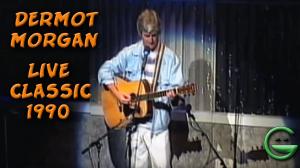
Dermot Morgan live classic 1990 | Grintage Ireland
Dermot Morgan classic parody piss-take of The Wolf Tones and Irish rebel anthem A Nation Once Again. It was filmed at The Entertainment Party Conference over...
Video di Alsatian Once Again
Lucone - 2020/12/31 - 01:28
Language: Italian
Ho rimesso mano alla precedente traduzione di “A nation once again” se qualche buon cuore volesse cancellare la mia precedente..
Come già scrivevo
Terre celtiche
Come già scrivevo
"Morto trentenne, Thomas Davis oltre che imbevuto di studi classici, era un romantico "tout court", che si adoperava per un'Irlanda unita e libera; nella poesia egli dichiara di essere pronto a sacrificare la sua vita (le sue aspettative di carriera e di farsi una famiglia) per il bene dell'Irlanda, e si vota a una missione più alta, come se si trattasse di un servizio divino! (era chiaramente, figlio del suo tempo)"
Terre celtiche
DI NUOVO NAZIONE (traduzione Cattia Salto)
Quando ardore di fanciullo mi scorreva nelle vene,
leggevo di antichi uomini liberi
che si batterono valorosi per Grecia e per Roma,
i 300, i 3 uomini (1),
allora pregai di riuscire a vedere
le nostre catene (2) spezzate in due
e l’Irlanda a lungo una provincia, essere
di nuovo nazione.
RITORNELLO
Di nuovo nazione,
di nuovo nazione,
l’Irlanda a lungo provincia essere
di nuovo nazione
(E’) Da allora, attraverso grandi sventure,
che la speranza ha acceso una luce lontana;
né il più luminoso bagliore estivo dell’amore
potè offuscare quella luce solenne di stella,
sembrava vegliare al di sopra di me (3),
nel tribunale, i campi e la chiesa (4);
un angelo cantava intorno al mio letto
“Di nuovo una nazione”
Sussurrava anche, quell’arca della libertà,
che il servizio celeste e santo
avrebbe potuto essere profanato da oscuri sentimenti,
e da passioni vane o infime;
che Libertà viene dalla mano destra di Dio
e bisogna di una spinta divina;
noi giusti dobbiamo far diventare la nostra terra,
di nuovo una Nazione!
Così mentre crescevo da ragazzo a uomo,
ho obbedito a quel richiamo,
liberato il mio spirito da ogni interesse egoistico
e crudele passione;
sperando un giorno di essere d’aiuto.
Oh, può essere tale speranza vana?
Quando il mio amato Paese diventerà
“Di nuovo una nazione”
Quando ardore di fanciullo mi scorreva nelle vene,
leggevo di antichi uomini liberi
che si batterono valorosi per Grecia e per Roma,
i 300, i 3 uomini (1),
allora pregai di riuscire a vedere
le nostre catene (2) spezzate in due
e l’Irlanda a lungo una provincia, essere
di nuovo nazione.
RITORNELLO
Di nuovo nazione,
di nuovo nazione,
l’Irlanda a lungo provincia essere
di nuovo nazione
(E’) Da allora, attraverso grandi sventure,
che la speranza ha acceso una luce lontana;
né il più luminoso bagliore estivo dell’amore
potè offuscare quella luce solenne di stella,
sembrava vegliare al di sopra di me (3),
nel tribunale, i campi e la chiesa (4);
un angelo cantava intorno al mio letto
“Di nuovo una nazione”
Sussurrava anche, quell’arca della libertà,
che il servizio celeste e santo
avrebbe potuto essere profanato da oscuri sentimenti,
e da passioni vane o infime;
che Libertà viene dalla mano destra di Dio
e bisogna di una spinta divina;
noi giusti dobbiamo far diventare la nostra terra,
di nuovo una Nazione!
Così mentre crescevo da ragazzo a uomo,
ho obbedito a quel richiamo,
liberato il mio spirito da ogni interesse egoistico
e crudele passione;
sperando un giorno di essere d’aiuto.
Oh, può essere tale speranza vana?
Quando il mio amato Paese diventerà
“Di nuovo una nazione”
(1) i 300 spartani che rallentarono l’avanzata dei persiani alle Termopili nel 480 a.C. a costo della vita, esempio di eroico sacrificio per la libertà delle città greche. In merito ai 3 alcuni ritengono che si riferisca ai tre gemelli Orazi che combatterono per Roma contro i tre gemelli di Albalonga. Più una leggenda che un fatto storico riportato da Tito Livio secondo il quale nel VII secolo a.C. per dirimere la lotta tra Roma e Albalonga, si concordò un duello, gli Orazi contro i Curiazi, due degli Orazi vengono subito uccisi e il terzo giocando d'astuzia finge di scappare, nell'inseguimento i tre Curiazi si distanziarono tra loro, essendo due di essi feriti anche se non gravemente. L'Orazio così si volta repentinamente verso il primo nemico e lo uccide poi si rimette a correre e così via fino a uccidere anche il terzo Curiazio. La citazione sulle gloria di Roma a mio avviso non è molto calzante e si dovrebbe intendere come Orazi=Inglesi con le loro mire espansionistiche e imperiali e Curiazi=Irlandesi, anche se ci fanno la figura degli ingenui e tutti parteggiano per il terzo Orazio! Il contesto in questo caso è ovviamente sbagliato perchè furono i Romani (all'inizio delle loro mire espansionistiche) ad attaccare Albalonga e a distruggerla.
In effetti nella nota alla poesia in "The Spirit of the Nation" si fa riferimento al Ponte Sublicio e a tre romani. La leggenda - sempre da Tito Livio - riferisce che, Orazio Coclite mitico eroe romano del VI sec a.C., difese il ponte che conduceva a Roma dagli Etruschi di Chiusi, impedendone l'avanzata. Inizialmente i romani erano tre: Orazio Coclite (da un occhio solo), Spurio Larcio e Tito Erminio. Così lottarono fianco a fianco contro l'orda dei nemici, mentre i compagni demolivano il ponte; poi Orazio costrinse gli altri due a mettersi in salvo e ultimo rimase in mezzo al ponte in attesa del crollo. Gli autori latini dissentono sul finale, secondo Polibio egli affogò nel Tevere, secondo Tito Livio riuscì a salvarsi a nuoto e a raggiungere Roma, dove gli vennero tributati gli onori.
(2) fetters: "catene" termine obsoleto e aulico utilizzato prevalentemente in poesia
(3) è la luce che si sprigiona dall'Angelo (inviato da Dio) a riverberare i suoi bagliori sulla terra d'Irlanda
(4) fane: termine arcaico per indicare un tempio o una chiesa dal latino fanum
In effetti nella nota alla poesia in "The Spirit of the Nation" si fa riferimento al Ponte Sublicio e a tre romani. La leggenda - sempre da Tito Livio - riferisce che, Orazio Coclite mitico eroe romano del VI sec a.C., difese il ponte che conduceva a Roma dagli Etruschi di Chiusi, impedendone l'avanzata. Inizialmente i romani erano tre: Orazio Coclite (da un occhio solo), Spurio Larcio e Tito Erminio. Così lottarono fianco a fianco contro l'orda dei nemici, mentre i compagni demolivano il ponte; poi Orazio costrinse gli altri due a mettersi in salvo e ultimo rimase in mezzo al ponte in attesa del crollo. Gli autori latini dissentono sul finale, secondo Polibio egli affogò nel Tevere, secondo Tito Livio riuscì a salvarsi a nuoto e a raggiungere Roma, dove gli vennero tributati gli onori.
(2) fetters: "catene" termine obsoleto e aulico utilizzato prevalentemente in poesia
(3) è la luce che si sprigiona dall'Angelo (inviato da Dio) a riverberare i suoi bagliori sulla terra d'Irlanda
(4) fane: termine arcaico per indicare un tempio o una chiesa dal latino fanum
Contributed by Cattia Salto - 2022/1/5 - 14:35
×
![]()
Note for non-Italian users: Sorry, though the interface of this website is translated into English, most commentaries and biographies are in Italian and/or in other languages like French, German, Spanish, Russian etc.

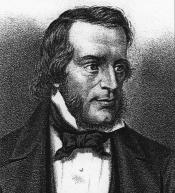
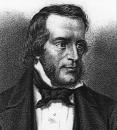
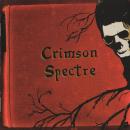
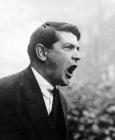
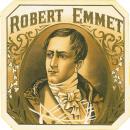
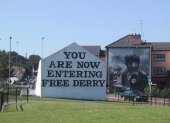
Davis believed that songs could have a strong emotional impact on people. He wrote that "a song is worth a thousand harangues". He felt that music could have a particularly strong influence on Irish people at that time. He wrote: "Music is the first faculty of the Irish... we will endeavour to teach the people to sing the songs of their country that they may keep alive in their minds the love of the fatherland."
"A Nation Once Again" was first published in The Nation on 13 July 1844 and quickly became a rallying call for the growing Irish nationalist movement at that time.
The song is a prime example of the "Irish rebel music" subgenre. The song's narrator dreams of a time when Ireland will be, as the title suggests, a free land, with "our fetters rent in twain". The lyrics exhort Irish people to stand up and fight for their land: "And righteous men must make our land a nation once again".
It has been recorded by many Irish singers and groups, notably John McCormack, The Clancy Brothers, The Dubliners, The Wolfe Tones (a group with Republican leanings) in 1972, the Poxy Boggards, and The Irish Tenors (John McDermott, Ronan Tynan, Anthony Kearns) and Sean Conway for a 2007 single. In the Beatles' movie A Hard Day's Night, Paul McCartney's grandfather begins singing the song at the British police officers after they arrest him for peddling autographed pictures of the band members.
Davis copied the melody for the chorus from the second movement of Mozart's clarinet concerto.
A Nation Once Again - Wikipedia
A NATION ONCE AGAIN | Terre Celtiche Blog